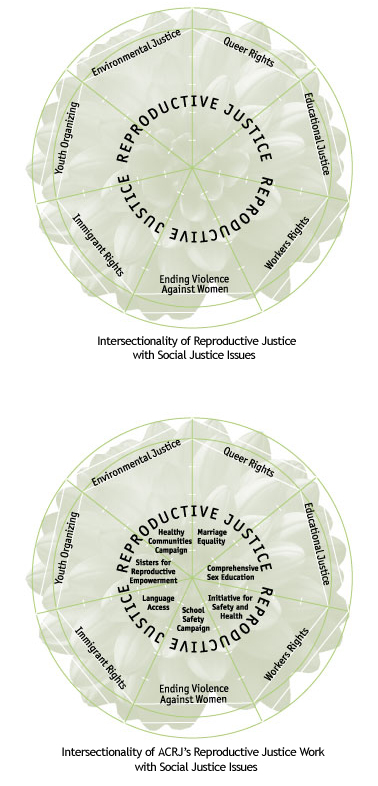Thirty-seven years ago today (Jan. 22, 1973), women in the U.S. were granted the right to ask for and receive abortions from trained medical professionals. This decision set off decades of protests by pro-life activists which occasionally have turned violent. (In a strange coincidence, the trial of Scott Roeder, who was arrested for murdering Dr. George Tiller, also begins today.)
While stalemate debates over abortion ethics continue, a promising series of side movements have emerged in recent years that help to contextualize the issue of abortion within a larger framework of reproductive, sexual, and social justice. An example of how this shift can occur is provided by Asian Communities for Reproductive Justice, a grassroots community organization based in Oakland, California.
The graph below demonstrates how ACRJ conceptualizes reproductive oppression and reproductive justice, and how to build a reproductive justice movement:

Click here to download a full-size PDF
The following two graphs illustrate how ACRJ conceptualizes the connections between social justice and reproductive justice. Note how the lower circle (which shows ACRJ’s work) also includes principles of sexual justice (although this is unnamed, and in my opinion could and should be more clearly articulated):

We at Sexuality & Society applaud the work of ACRJ; their leadership in modeling reproduction and sexuality within much larger frameworks of social justice is an inspiration to critical sexuality scholars, practitioners, and activists. Happy anniversary, Roe v. Wade.
See also:
- Melling, Louse, Director, ACLU Reproductive Freedom Project. (Jan. 21, 2010.) “Reflections on a Decade of Reproductive Freedom.” This article includes discussion of: the Global Gag Rule, Abstinence-only sex ed, anti-choice ballot measures, early abortion pill, and emergency contraception.

Comments 2
Amber R — January 24, 2010
This monumental anniversary was certainly not in any news headlines. ACRJ is to be commended for their continuing efforts. There is always more to be done but having a force such as them is the right step to providing sexual equality for all demographics.
Thanks...and Happy Anniversary!
Jay Livingston — January 25, 2010
We accord more importance to some anniversaries (multiples of 10 and 25) than to others (e.g., 37). Of more concern is the recent SCOTUS action in Citizens United. The conservative majority went out of their way to make a big change in the law. This same conservative (and perhaps not so coincidentally Catholic) bloc may extend their activism to reversing Roe or at least carving out large exceptions.